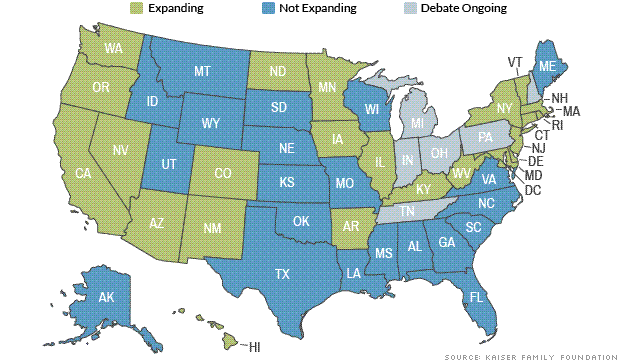States forgo billions by opting out of Medicaid expansion
By Tami Luhby @Luhby
July 1, 2013: 5:31 AM ET

Not all states are participating in Medicaid expansion.
NEW YORK (CNNMoney)
Nearly half the nation's states are opting not to expand Medicaid to all of
their low-income residents, leaving billions of federal dollars on the table and
millions of poor Americans uninsured.
At least 21 states are opting out of Medicaid expansion for next year. In
another six states, legislators are still weighing their options, according to
the Kaiser Family Foundation, which is tracking the states' plans.
The Supreme
Court changed the Obamacare rules last June when it decided that governors
and lawmakers could opt out of widening their Medicaid rosters. Under the
original health-care reform law, all those earning less than 138% of the federal
poverty line, or roughly $31,800 for a family of four, would have been eligible
for Medicaid. Medicaid rules currently vary from state to state, but many states
provide little to no coverage of childless, non-disabled and non-elderly adults.
A number of governors, particularly in red states, have stood their
ideological ground and chosen not to expand, citing concerns about the
additional financial burden. The federal government will pay for 100% of the
expansion for the first three years, then gradually reduce its subsidy to 90% by
2020.
Some governors have said that expansion would involve additional costs that
they couldn't afford and enlarge a program that they consider broken. In many
states, however, various analyses show that states would stand to gain millions
of dollars by expanding the program, at least initially.
Take the 14 states that were quick to declare they would not expand. They
will lose a total of $8.4 billion a year in federal payments in 2016, according
to a June report from Rand Corp.
While states will need to cover a portion of the Medicaid costs after that,
they are likely to make it up through new tax revenue spurred by the additional
federal spending, according to Carter Price, co-author of the report.
Related:
'I'm signing up for Obamacare'
In Michigan, a report by the University of Michigan and Blue Cross Blue
Shield of Michigan found that the state would save about $1 billion over 10
years if it expanded Medicaid. Most of the benefits come in the early years,
with the state having to shell out funds starting in 2020. Though Michigan's
Republican Governor Rick Snyder pushed hard for expansion, his peers in the
state legislature blocked it.
Different researchers included different measures when estimating savings in
their states. Some stuck purely to the payments from the feds, while others
looked at savings from reducing state programs aimed at the indigent, such as
mental health counseling and substance abuse treatment. And some looked at the
indirect benefits, such as the additional jobs and tax revenues likely to come
from higher federal funding.
"You can't make an economic case against expansion," said John Holahan, a
fellow at the Urban Institute.
In Virginia, state officials estimated the state would have to spend $137
million over 10 years were it to expand Medicaid. But if you take additional tax
revenue into account, that figure shifts to a savings of $555 million, according
to a study by the Commonwealth Institute, which advocates for low- and
moderate-income Virginians. The state has opted not to expand Medicaid at this
time, but established a committee to study it further.
The financial benefits spurred several GOP
governors, including Rick Scott in Florida and Jan Brewer of Arizona, to
break ranks with their peers and endorse Medicaid expansion. Brewer was
successful, but Scott was stymied by Republican legislators who refused to adopt
the program.
Medicaid expansion will take place in the GOP-led states of Nevada, New
Mexico, New Jersey, Iowa and North Dakota. It remains questionable in Ohio,
Indiana, Pennsylvania and Tennessee.
Conservatives are unswayed by the argument that states will benefit from
increased federal spending.
"Expanding Medicaid is not the path to economic growth that anybody should
want," said Joe Antos, a health care scholar at the right-leaning American
Enterprise Institute. "It's an inefficient way to create jobs. There are a lot
of better ways to stimulate the economy."
Also, Antos points out, the states themselves will not receive the federal
funds. The money will be given to hospitals and providers, but after 2016,
states will have to start contributing their own funds to the program.
What happens to impoverished citizens in states that don't expand? The most
likely answer is that they'll slip through the cracks and remain without health
insurance.
Some of these folks will be eligible for subsidies to buy individual health
insurance on state-based exchanges. But those with income below the poverty line
cannot receive subsidies,
because the Affordable Care Act intended for them to be covered through
Medicaid. If their state opts out, they're stranded. (They also will not be
subject to financial penalties for not having insurance. Those penalties begin
at $95 per adult in 2014 and increase in later years.)
As it stands now, an estimated 11.5 million uninsured, non-elderly, poor
adults live in states that have opted out, according to Kaiser.
State officials can change their mind and join the Medicaid expansion in the
future. But next year, many poor Americans will not be able to participate in
Obamacare.
"They are giving up significant federal funding and the chance to cover
their neediest citizens," said Kathy Gifford, managing principal at Health
Management Associates, a research and consulting firm.
First Published: July 1, 2013: 5:31 AM ET